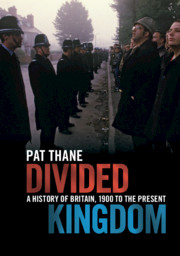59 results
John Stewart (2020), Richard Titmuss: A Commitment to Welfare, Bristol: Policy Press, £47.99, pp. 600, hbk.
-
- Journal:
- Journal of Social Policy / Volume 53 / Issue 1 / January 2024
- Published online by Cambridge University Press:
- 06 November 2023, pp. e4-e9
- Print publication:
- January 2024
-
- Article
- Export citation
Stewart Lansley (2021), The Richer, The Poorer: How Britain Enriched the Few and Failed the Poor. A 200-Year History, Bristol: Policy Press, £19.99, pp. 318, pbk.
-
- Journal:
- Journal of Social Policy / Volume 51 / Issue 4 / October 2022
- Published online by Cambridge University Press:
- 12 August 2022, pp. 991-996
- Print publication:
- October 2022
-
- Article
- Export citation
Malcolm Torry (2021) Basic Income: A History, Cheltenham: Edward Elgar, £100.00, pp. 336, hbk.
-
- Journal:
- Journal of Social Policy / Volume 51 / Issue 3 / July 2022
- Published online by Cambridge University Press:
- 06 June 2022, pp. 662-667
- Print publication:
- July 2022
-
- Article
- Export citation
Peter Sloman (2019), Transfer State: The Idea of a Guaranteed Income and the Politics of Redistribution in Modern Britain, Oxford: Oxford University Press, £69.00, pp. 318, hbk.
-
- Journal:
- Journal of Social Policy / Volume 51 / Issue 1 / January 2022
- Published online by Cambridge University Press:
- 18 November 2021, pp. 214-218
- Print publication:
- January 2022
-
- Article
- Export citation
Growing Old with the Welfare State. Eight British Lives Nick Hubble, Jennie Taylor and Philip Tew (eds), Bloomsbury Academic, London, 2019, 159 pp., pbk £17.99, ISBN 13: 978-1-3500-3309-2
-
- Journal:
- Ageing & Society / Volume 40 / Issue 5 / May 2020
- Published online by Cambridge University Press:
- 08 April 2020, pp. 1152-1154
- Print publication:
- May 2020
-
- Article
- Export citation
Charlotte Greenhalgh. Aging in Twentieth-Century Britain. Berkeley Series in British Studies. Oakland: University of California Press, 2018. Pp. 262. $85.00 (cloth).
-
- Journal:
- Journal of British Studies / Volume 58 / Issue 2 / April 2019
- Published online by Cambridge University Press:
- 09 May 2019, pp. 435-436
- Print publication:
- April 2019
-
- Article
- Export citation

Divided Kingdom
- A History of Britain, 1900 to the Present
-
- Published online:
- 12 December 2018
- Print publication:
- 02 August 2018
-
- Textbook
- Export citation
Index
-
- Book:
- Divided Kingdom
- Published online:
- 12 December 2018
- Print publication:
- 02 August 2018, pp 485-494
-
- Chapter
- Export citation
Chapter 5 - The Thirties, 1931–1939
-
- Book:
- Divided Kingdom
- Published online:
- 12 December 2018
- Print publication:
- 02 August 2018, pp 118-150
-
- Chapter
- Export citation
Chapter 13 - Things Can Only Get Better? New Labour, 1997–2010
-
- Book:
- Divided Kingdom
- Published online:
- 12 December 2018
- Print publication:
- 02 August 2018, pp 422-467
-
- Chapter
- Export citation
Chapter 8 - An Affluent Society? 1951–1964
-
- Book:
- Divided Kingdom
- Published online:
- 12 December 2018
- Print publication:
- 02 August 2018, pp 220-261
-
- Chapter
- Export citation
Chapter 1 - United Kingdom? 1900–1914
-
- Book:
- Divided Kingdom
- Published online:
- 12 December 2018
- Print publication:
- 02 August 2018, pp 8-38
-
- Chapter
- Export citation
Chapter 3 - Reconstruction? 1918–1922
-
- Book:
- Divided Kingdom
- Published online:
- 12 December 2018
- Print publication:
- 02 August 2018, pp 63-86
-
- Chapter
- Export citation
Further Reading
-
- Book:
- Divided Kingdom
- Published online:
- 12 December 2018
- Print publication:
- 02 August 2018, pp 476-484
-
- Chapter
- Export citation
Frontmatter
-
- Book:
- Divided Kingdom
- Published online:
- 12 December 2018
- Print publication:
- 02 August 2018, pp i-iv
-
- Chapter
- Export citation
Introduction
-
- Book:
- Divided Kingdom
- Published online:
- 12 December 2018
- Print publication:
- 02 August 2018, pp 1-7
-
- Chapter
- Export citation
Chapter 4 - Democratic Britain? 1922–1931
-
- Book:
- Divided Kingdom
- Published online:
- 12 December 2018
- Print publication:
- 02 August 2018, pp 87-117
-
- Chapter
- Export citation
Chapter 14 - Conclusion
-
- Book:
- Divided Kingdom
- Published online:
- 12 December 2018
- Print publication:
- 02 August 2018, pp 468-475
-
- Chapter
- Export citation
Abbreviations
-
- Book:
- Divided Kingdom
- Published online:
- 12 December 2018
- Print publication:
- 02 August 2018, pp xi-xii
-
- Chapter
- Export citation
Chapter 2 - The ‘Great’ War
-
- Book:
- Divided Kingdom
- Published online:
- 12 December 2018
- Print publication:
- 02 August 2018, pp 39-62
-
- Chapter
- Export citation



